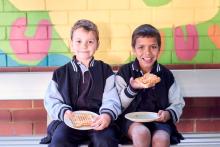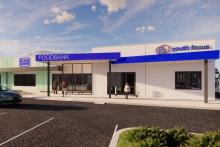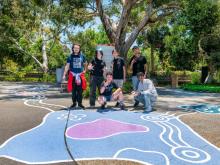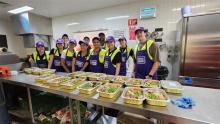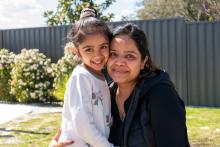Families form the backbone of communities across the world and addressing the economic and social challenges they face is a key aspect of International Day of Families.

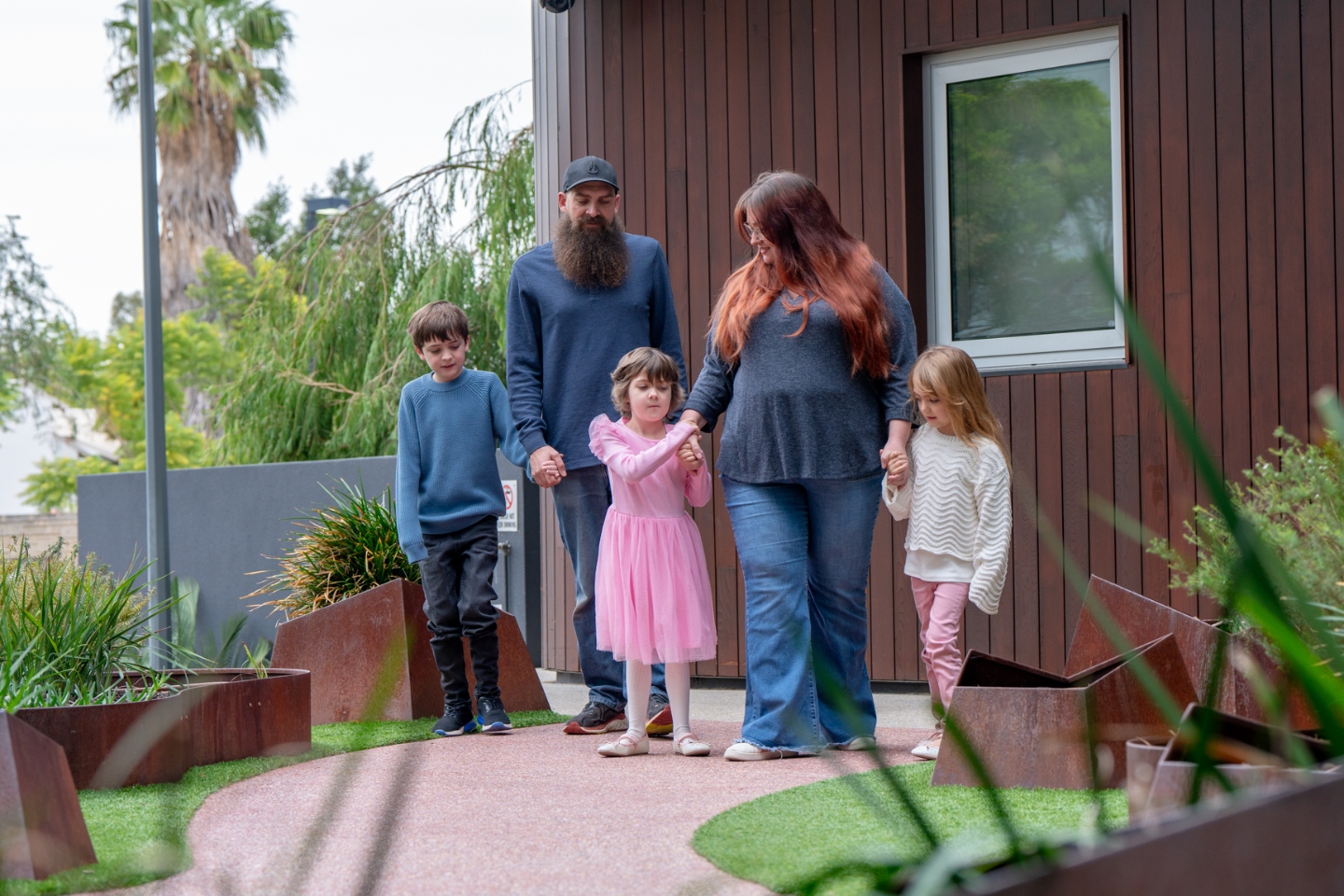
Families form the backbone of communities across the world and addressing the economic and social challenges they face is a key aspect of International Day of Families, recognised on May 15 each year.
Western Australia is the most isolated health jurisdiction in the world, which presents many challenges when regional and rural families need medical treatment in Perth, causing them to be far from home.
These challenges include access to affordable accommodation, additional costs associated with being away from home, potential loss of income, and the emotional and mental stresses of caring for an ill or injured child without a strong support network.
In 2024, Ronald McDonald House Charities WA supported more than 1,800 families through its House program, helping to alleviate financial and emotional pressures for those families.
Providing essential services, such as accommodation, is a core part of RMHC WA’s mission, as it aims to remove barriers, strengthen families, and promote healing when children need healthcare.
RMHC WA's 2024 Impact Report, produced by Social Ventures Australia, found 91 per cent of families felt that accessing RMHC WA’s services helped their family feel stronger and more resilient to cope with their difficult circumstances.
Of the families surveyed, 78 per cent reported that without RMHC WA their emotional wellbeing would have been poor or very poor, and 69 per cent would have found their financial wellbeing stressful and difficult to manage.

Rosalie Wheeler (right) with her twin sister Cassie during one of their family reunions.
The Wheeler family accessed RMHC WA’s services from 2022 until 2025 for a total of 949 nights, making it the longest consecutive stay at the organisation’s accommodation offering since its inception.
In November 2022, Rosalie Wheeler and her mother Ayla Wheeler were flown to Perth from Leonora, their hometown in the Goldfields-Esperance region, on an emergency flight with the Royal Flying Doctor Service.
In Perth, Rosalie was diagnosed with High-Risk Acute Lymphoblastic Leukaemia, sparking the start of her and her mother’s extended stay in the state’s capital city.
Left behind in Leonora was Ayla Wheeler’s husband Ben, their son Raiden, and their daughter – Rosalie’s twin sister – Cassie. Mr Wheeler became the fulltime carer of Raiden and Cassie, while continuing to work to financially support the family.
The three family members travelled to and from Perth to spend time with Ms Wheeler and Rosalie whenever they could, staying at RMHC WA during these trips.
Accessing RMHC WA’s services alleviated financial and emotional pressures on the Wheeler family by providing accommodation, home cooked meals, tutoring through the Ronald McDonald Learning Program, play and learning programs for all three children and creating an overall sense of community and belonging.
"RMHC WA gives families like ours so much more than somewhere to sleep; they give community, support, security, safety and peace of mind, and things like that cannot be put into words how important they are to us." Ayla Wheeler
Rosalie was given the all-clear from doctors to return home to Leonora in March this year, bringing a 2.5-year hospital stay to an end.
Ms Wheeler said RMHC WA provided far more than a place to stay.
“RMHC WA gives families like ours so much more than somewhere to sleep; they give community, support, security, safety and peace of mind, and things like that cannot be put into words how important they are to us,” Ms Wheeler said.
“They gave us an island of security when we were going through the most terrifying experience of our lives to date.
“Coming from a small town and a close family, we struggled at first with the isolation but all the people we met – the staff, the volunteers, the families like ours – they very quickly became our rock and our support network.
“I can truly say that they became our family and made it more than a house, as it was in all aspects of the word, our home.”
Ms Wheeler said being away from the rest of the family was one of the biggest struggles during her extended stay in Perth with Rosalie.
“Though everyone understood to some extent that it was something we needed to do, it didn’t make having to say goodbye over and over again any easier on anyone,” she said.
“You never get used to watching your family leave or having to walk away from half of your world. It was one of the most heartbreaking experiences of my life.
“Coming back home and being able to be under the same roof is amazing. You don't realise how much the little things like cuddling on the couch watching TV mean until they are not there anymore.
“Being able to just be together and not have to keep saying goodbye and limit my time with my family has been everything.”

The Wheeler family accessed RMHC WA's services for a total 949 nights.
Reflecting on her family’s experience with RMHC WA, Ms Wheeler said it had been one of the most amazing organisations for a family like hers.
“When you have a sick child, it's just so easy to forget about the celebrations, the fun and the normality,” she said.
“Through the learning program, fun family activities, day-to-day operations, and their absolute commitment to putting a smile on each family’s face, RMHC WA does an amazing job at giving back some of that security, normality and enjoyment that would otherwise be looked over.
“Words cannot be enough to express how truly grateful I am for everything they have done for us.”
After returning to Leonora post-illness, Ms Wheeler said Rosalie adjusted back into life in her hometown with ease.
“Coming back home after so long away was a bit of a scary concept but it is amazing how Rosalie has just slotted right back into life here in Leonora,” Ms Wheeler said.
“She has gone straight back to school and everyone we come across has been so happy to have her back in town with so many smiles and congratulations.
“She truly is a Leonora Girl and the love this community has for her is beautiful. It’s the sense of small-town community that means so much to us, which is one thing that Ronald McDonald House had as well and one of the reasons it will always be like our second home.”
According to RMHC WA, the number of families with ill or injured children needing supportive services are increasing each year, with demand starting to outweigh capacity.
The charitable organisation works closely with WA’s maternity, child and adolescent health systems and works with Perth Children’s Hospital and King Edward Memorial Hospital to support overall family wellbeing.
Families face rocketing food costs
Rising cost of living and the economic consequences this has for families is a leading focus for this year’s International Day of Families.
In addition to the financial burden of unexpected illness or injury, there is also the swift rise of food and grocery bills, stagnant wages, and limited access to affordable childcare and healthcare.

Foodbank WA focuses on food cost reduction to help feed families.
In response to the financial pressure on all family types to put food on the table, Foodbank WA is targeting the reduction of food costs for families.
“Economic burdens can strain relationships and limit opportunities, particularly for single-parent or low-income households,” Foodbank WA chief executive Kate O’Hara said.
“By reducing food costs overnight, we ensure people can redirect budgets to keeping a roof over their heads, accessing the medication they need and without having to compromise on eating healthy and nutritious food.
“The statistics can’t be ignored. Households, no matter how they are configured – traditional or non-traditional – they are struggling.
“Our Foodbank WA Customer Survey conducted in December 2024 revealed that our client base includes 37 per cent of households comprised of single parents while a huge 71 per cent live with other people, meaning they live with extended family and/or friends to make ends meet.
“With more and more people struggling to make ends meet, we often hear that while families continue to persevere, often by pooling resources, sharing responsibilities, and building strong support networks, they still need to reach out for a helping hand.”
"By recognising the value of both traditional and non-traditional families, societies can ensure stronger, more connected communities for generations to come." Foodbank WA CEO Kate O'Hara
As part of its mission, Foodbank WA actively supports the No Place for Poverty campaign, which is a movement working to create fairer systems and stronger communities.
“Understanding and supporting all family types is essential for building resilient communities,” Ms O’Hara said.
“Policymakers must address the challenges families face by investing in education, healthcare, housing, and family-friendly workplace policies.
“By recognising the value of both traditional and non-traditional families, societies can ensure stronger, more connected communities for generations to come.”
Foodbank WA recently partnered with the Y WA’s Westminster Early Learning Centre (ELC) after being approached by the centre’s staff to initiate the Parent Assistant Project, providing families with access to fresh fruits, vegetables and dry food.
While the initiative with Foodbank WA is helping ease financial strain and promote healthier eating habits, the Y WA’s centre is also working with other community partners to expand the project further and encourage parents in need to reach out for support.

The Y WA creates welcoming and inclusive environments for families to find connection and belonging.
Keeping families connected
Families come in all shapes and sizes, each with their own story, strength and beauty, and every family deserves to feel seen and supported regardless of their differences.
Social connection is vital to fostering a sense of belonging for families within their community, and the Y WA specialises in creating welcoming, inclusive spaces for families to access supportive services.
Small moments can often have the greatest impact and this concept is embedded in the attitude of the team at the Y WA’s Westminster ELC.
ELC director Dinusha Kalupahana said greeting each child and family by name and asking ‘how are you?’ with a smile and eye contact can make all the difference to setting the tone and making families feel welcomed.
“These moments build trust and connection and set a warm, positive tone for the day,” Ms Kalupahana said.
“This sense of connection continues throughout the day, as educators maintain open and regular communication with families.”
The Y WA’s Serpentine Jarrahdale (SJ) Recreation Centre is also designed to be a welcoming community hub for families of all ages, from babies as young as eight weeks old to seniors in their 90s.
The centre manager Nicole Little said the venue offers programs that bring generations together and foster a sense of belonging.
“Our main aim is to be a centre for everyone...It’s about more than just fitness - it’s about building a strong, connected community where families feel they truly belong,” Ms Little said.

Mutual respect is fundamental to build strong community connection and generate feelings of belonging for families, and respecting cultural difference is a core element of this.
The Y WA proudly creates environments where families can feel represented, accepted and ultimately, respected.
At the Y School in Mirrabooka, the youth work team fosters a culturally safe space for both students and their families, from initiating early conversations about a family’s cultural needs to delivering dedicated weekly sessions about culture and community.
The Y School creates room for students to share their backgrounds, beliefs, and traditions beyond one-off celebrations by encouraging cultural diversity to be weaved into the fabric of the school’s identity.
This is being delivered through initiatives such as creating a prayer room on-site, offering flexibility around attendance for cultural observances, and celebrating key cultural days all support students’ sense of belonging.
“This helps us create and maintain a diverse and equitable space for everyone who engages with our school,” the team at Y School in Mirrabooka explained.
For 15 years, the Y WA has had a partnership with the Boronia Pre-Release Centre for Women, providing parenting support, life skills workshops, and high-quality early learning programs.
This ongoing work strengthens family bonds and supports reintegration, helping mothers build the skills and connections they need to flourish once they are released.
"It’s about showing families that no matter their circumstances, they matter." The Y WA playgroup support worker Emma Stewart
Diversity shines through the work of the Y WA, clearly evident within its variety of program offerings and the types of communities it serves, and the organisation’s initiative with the Boronia Pre-Release Centre for Women is a powerful example of how the Y WA supports all families, including those in the justice system.
Playgroup support worker Emma Stewart works with families involved in this program who are often facing significant challenges.
Ms Stewart’s approach is grounded in connection, respect, and community.
“We regularly seek feedback from mothers and grandmothers, children and other family members and encourage them to be part of the decision-making process,” she said.
“This helps shape a playgroup where everyone feels safe, welcomed, and able to contribute. It’s about showing families that no matter their circumstances, they matter.”
Whether it’s planning activities that reflect different cultures or ensuring resources speak to a variety of family structures, Ms Stewart’s work is about building bonds that allow families to flourish, even in difficult circumstances.
The Y WA’s culture of care extends beyond the families it supports to also support its own people, encouraging employees and volunteers to show up for important family moments, such as attending school events, sports carnivals and performances, or caring for an unwell loved one.
The organisation also provides eligible staff with two weeks of paid parental leave, reflecting its commitment to creating a workplace where everyone feels valued, supported, and empowered to flourish.






